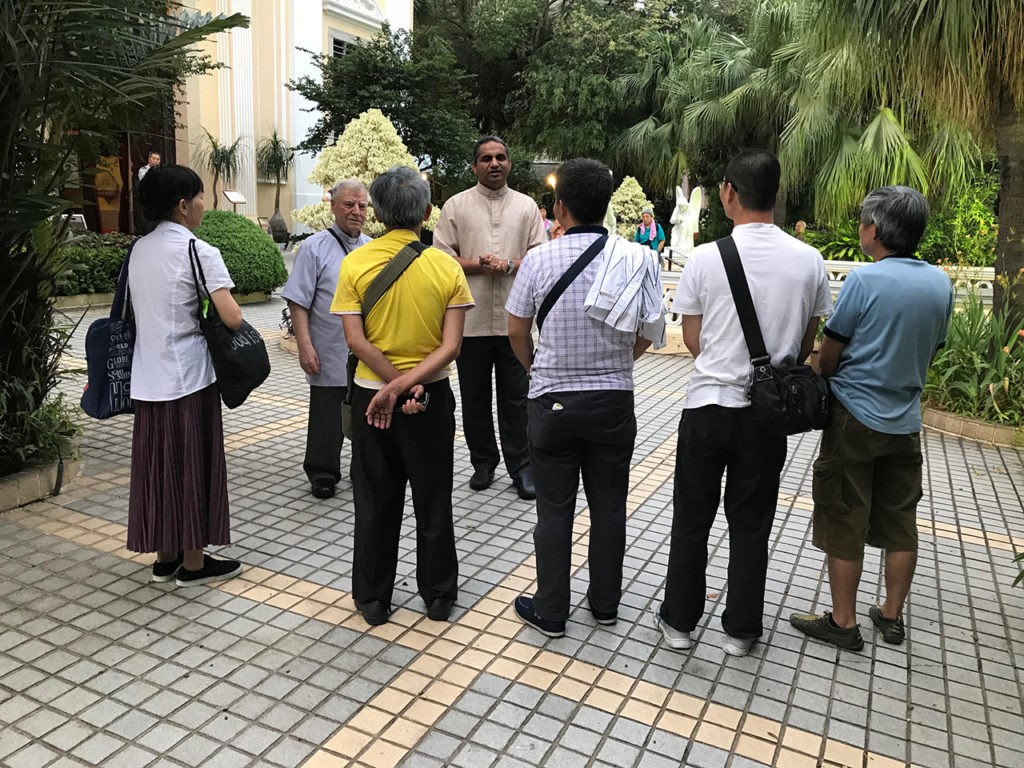Pedro Daniel Oliveira
Daily distribution of food in Saint Lawrence’s Church gives hope to about 70 poor people. The program was introduced after the First World Day of the Poor on November 19, 2017. The Macau Social Welfare Bureau admits that there is poverty in the territory, although stressing the figures indicate a decline. Last year it had dealt with around 9,000 cases.
It’s 6:30 PM of Wednesday, June 6. Ms Tong (real name withheld) is seated in front of Saint Lawrence’s Church. She expects to receive a box full of rice and meat, or any kind of food, but the typhoon’s threat leaves an uncertainty in her mind. Is she leaving this time without anything to feed her stomach? “No one wants to know about me. Nobody cares to help me. At least I feel happy here, because I have some comfort,” she says in a somewhat dim voice.
Ms Tong is of Chinese ethnicity born in Macau. She lives in the vicinity of Saint Lawrence’s Church, and she is one of about 70 people attending the food aid in the churchyard. Introduced by Parish Priest Fr Jojo Ancheril, CMF, the food distribution starts everyday at 7:15 PM, right after a short prayer with everyone in the church.
Sitting next to her is Mr Chang (real name withheld). He lives with little and relies on charity. “I am alone. I don’t have a job. I used to be in the neighborhood when I heard about the food distribution. I decided to come even if I’m not a Catholic. I feel in peace here. We can talk among ourselves. The food is also good,” he says. Nearby is Fr Mario Bonfaini, CMF, Italian priest who often gives a spiritual hand to the poor taking part in this activity.
It all started last November on First World Day of the Poor, when Pope Francis asked for help to tackle the poverty-stricken worldwide. “We didn’t have a special program in the Parish, but our bishop [Stephen Lee Bun-sang] asked the Parish Priests to do something for the poor,” Fr Ancheril told us.
“On that very same day, I took action by saying after the Mass, ‘If there are poor people in Saint Lawrence’s neighborhood I invite them to come and to meet me in the church, because I would like to take them to dinner.’” Fr Ancheril was criticized by “certain individuals,” who told him: “There are no poor people in Macau. Those are foreigners. Maybe you don’t know the Macau reality well.”
Nevertheless, to his great surprise six people came to him that night. The number has increased considerably, now reaching about 60 or 70 people, depending on the days. Most are Chinese from Macau, but also from Mainland China and Hong Kong, as well as Portuguese speakers living in the territory.
“At first, I took them to a particular Chinese restaurant in the neighborhood, but as the number of people began to increase, it became impossible to go on this way. Fortunately, the restaurant owner is Catholic, and was willing to sell us food without making any profit,” Fr Ancheril said. Moreover, he is grateful to another restaurant owner who provides the buffet for the poor on the last Saturday of each month, having the hall of Saint Lawrence’s Church as venue. The expenses are shouldered by the Society of Saint Vincent de Paul.
“I didn’t expect so many people to come day by day. However, there is more and more. Sometimes they are more than the food available. If it is so, I need to make a call to the restaurant and order more food. Delivery will take about 15 minutes,” Fr Ancheril added.
Figures by IAS
Last year, the Macau Social Welfare Bureau (IAS) provided financial support to 4,118 households, corresponding to a total of 6,535 individuals. IAS took into account the amount of social risk defined – MOP 4,050 for a single household – for cases under economic deprivation resulting from social, health and other factors requiring special support.
“In addition, as per the results of the analysis of households supported by the IAS, and the reasons for requesting subsidies, households receiving economic support are classified into five main types – family members with serious illness, families with the elderly, families with the unemployed, single parents, and families with disabled people,” IAS Public Relations and Media Division Lee Kuai Heng told in a statement sent to O CLARIM through e-mail.
“Accordingly, this Bureau also grants special allowances to three types of families in vulnerable situations,” she added, while referring to single-parent families, individuals with disabilities and those with chronic illness.
As for the relief measures that Macau Government has in place to tackle poverty in Macau, she mentioned, “IAS has been developing the plan for the development of family and community services …”, adding last year the same Bureau “optimized the management of about 9,000 cases ….”
“In fact, the number of subsidized cases has been decreasing in recent years, and the number of beneficiaries successfully leaving poverty is higher than the number of new subsidy applications. It shows improvement regarding the poverty issues in Macau,” Mrs Heng concluded on behalf of IAS.


 Follow
Follow


